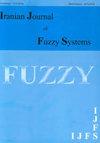(1912-5600)基于MPPT算法的2型自适应模糊控制方法应用于变速DFIG型风力发电机组
IF 1.2
4区 数学
Q1 MATHEMATICS
引用次数: 3
摘要
本文提出并设计了一种2型自适应模糊控制方法,应用于变速双馈异步直连风力发电机组。它带来了这项研究,以评估整个系统的运作,以捕获风力涡轮机的最高功率率。该控制方法可使定子无功功率保持在理想状态。与其他研究不同的是,这里的控制技术是通过非线性系统来发展的。为了在系统运行方面取得进展,与一类自适应模糊系统相比,提出了一类自适应模糊理论,以逼近跟踪误差中存在的大量不确定性和动态非线性,这些不确定性和非线性可能限制系统性能。反馈线性化控制方法帮助我们从代数上把系统变成线性化的对象。利用李雅普诺夫定理,证明了所引入的二类自适应模糊方法满足一致最终有界性。另一方面,它具有更好的跟踪功能。仿真结果表明,该方法在存在参数变化和非结构化不确定性时具有足够的鲁棒性。本文章由计算机程序翻译,如有差异,请以英文原文为准。
(1912-5600) Type 2 adaptive fuzzy control approach applied to variable speed DFIG based wind turbines with MPPT algorithm
In this research, a Type 2 adaptive fuzzy controller approach is formulated and designed to be applied to variable speed doubly fed induction generator-based wind turbines directly connected to the grid. It brings this study to evaluate the whole operation of the system to capture the highest rate of power in the wind turbines. The controlling approach is considered to keep the stator reactive power to the ideal value. In contrast to the other researches, here the controlling technique is developed through the nonlinear systems. By the aim of making progress in system operation, in contrast with the Type 1 adaptive fuzzy system, type two adaptive fuzzy theory is proposed to approximate a large number of uncertainties and the dynamic nonlinearities, exists in tracking errors which may limit the system performance. Feedback linearization control approach helps us to algebraically alter the system into a linearized plant. Thanks to the Lyapunov theorem, the introduced type two adaptive fuzzy approach is proved to meet the uniformly ultimately boundness (UUB) property. On the other hand, it results better tracking function. The simulation outputs represent that the proposed technique is robust enough in presence of parameter variations and unstructured uncertainties.
求助全文
通过发布文献求助,成功后即可免费获取论文全文。
去求助
来源期刊
CiteScore
3.50
自引率
16.70%
发文量
0
期刊介绍:
The two-monthly Iranian Journal of Fuzzy Systems (IJFS) aims to provide an international forum for refereed original research works in the theory and applications of fuzzy sets and systems in the areas of foundations, pure mathematics, artificial intelligence, control, robotics, data analysis, data mining, decision making, finance and management, information systems, operations research, pattern recognition and image processing, soft computing and uncertainty modeling.
Manuscripts submitted to the IJFS must be original unpublished work and should not be in consideration for publication elsewhere.

 求助内容:
求助内容: 应助结果提醒方式:
应助结果提醒方式:


